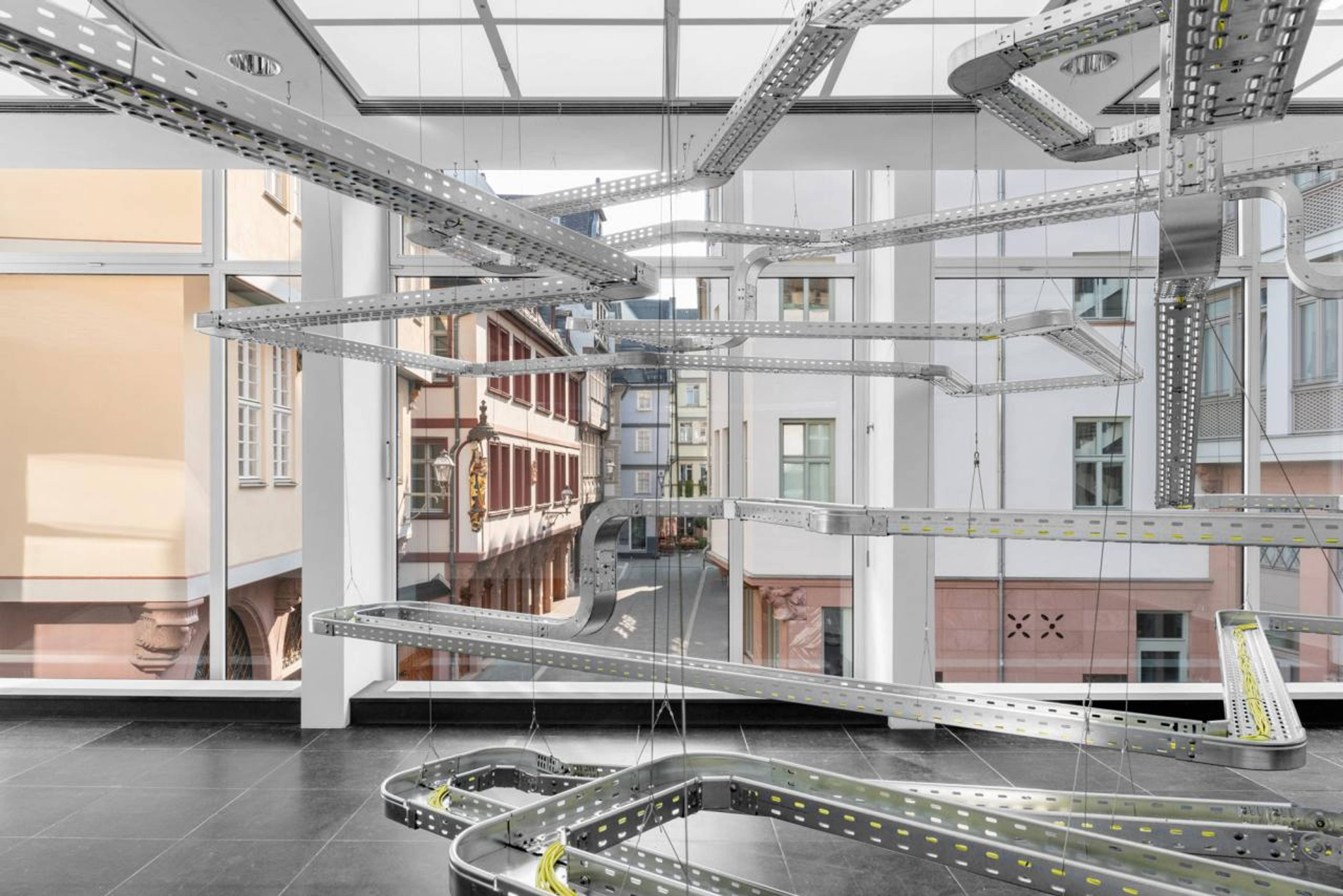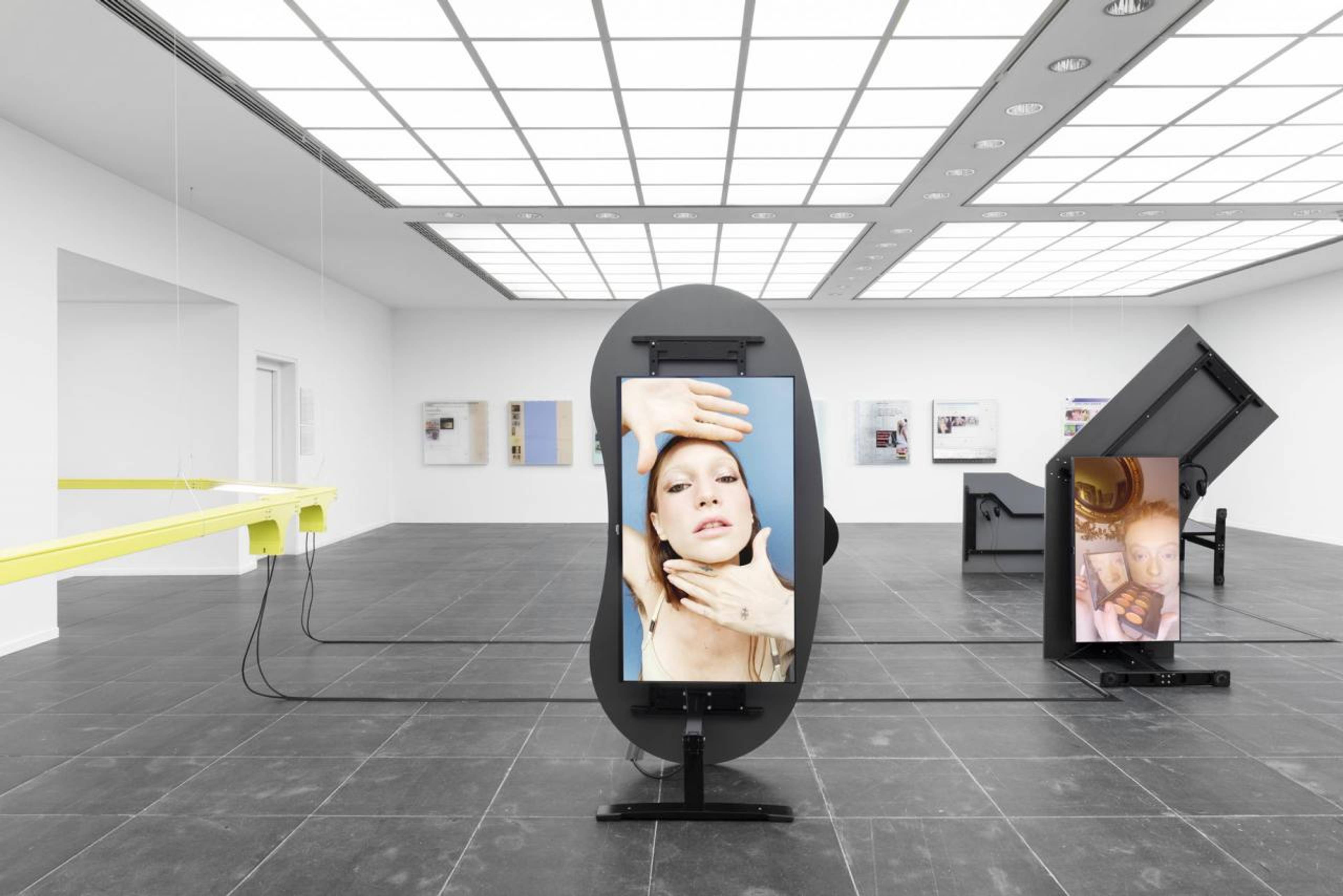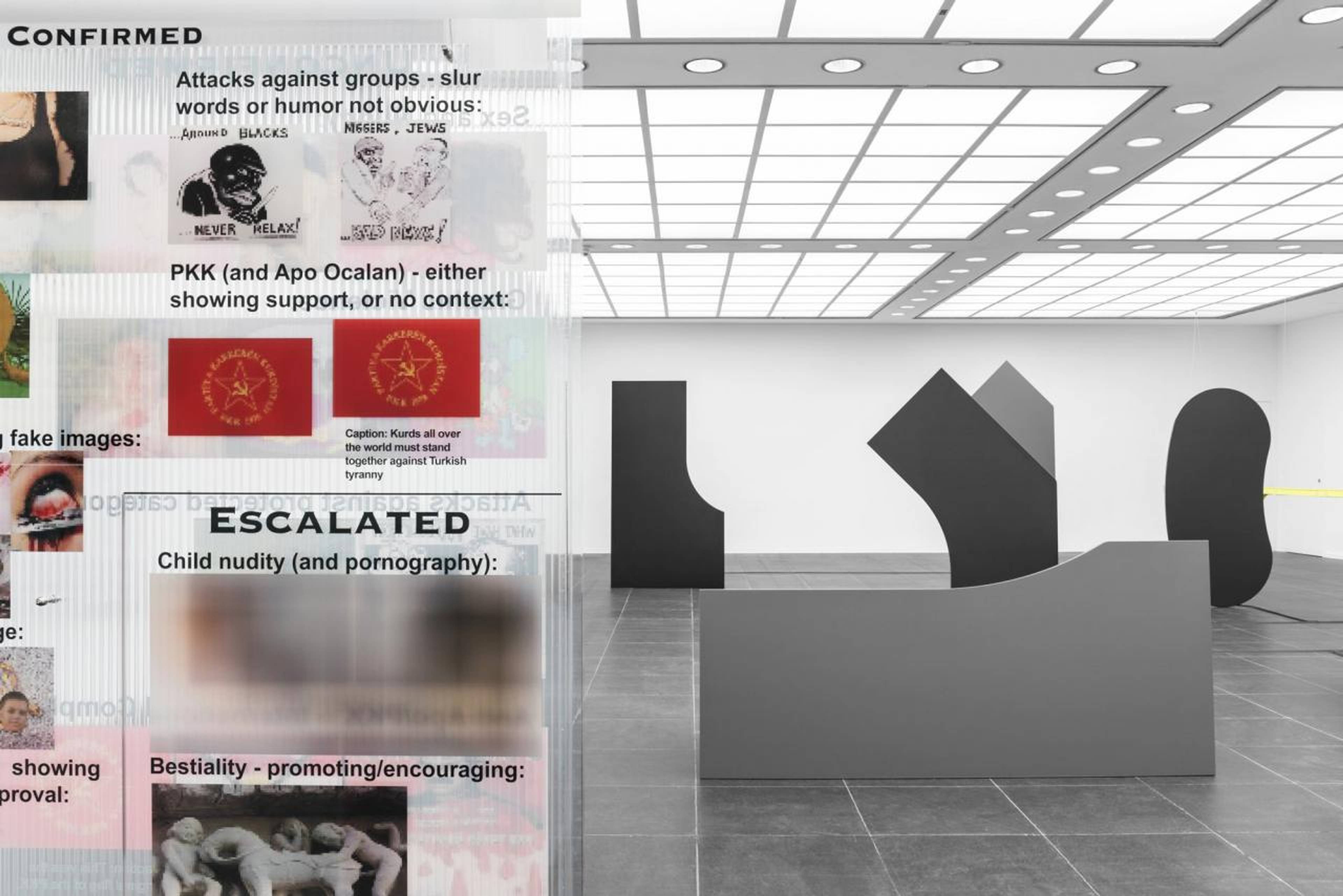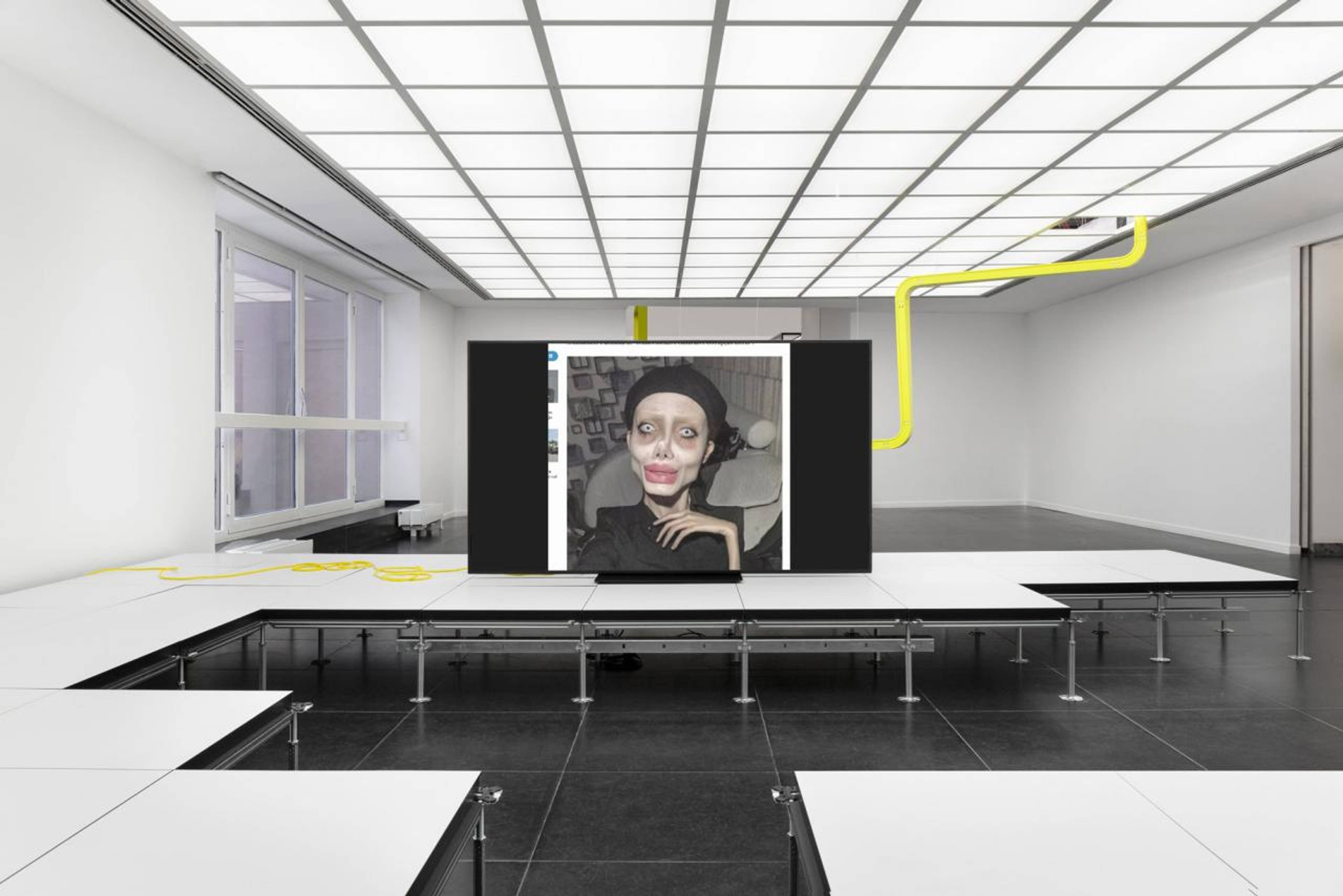A snake of chrome and yellow wires slithers, suspended, across three floors of the Frankfurter Kunstverein. Winding and labyrinthine, it forms a self-contained network: a sculpture circulating data throughout the space, its infrastructure visible, yet its contents all but obscured. Personal Photographs November 2007 (2019) turns image sharing, the pervasive impulse of our Insta-culture, inside out. Paradoxically, though, its makers, Eva & Franco Mattes, are unpictured – no screen or monitor displays the couple’s dog pics or vacation selfies, though any of us with an out-of-control iPhone camera roll can easily imagine these unseen images. Here, all we see is the material substrate, a closed loop alluding to the artists’ personal archives.
Despite taking up a fair amount of the exhibition’s real estate, the sculpture is merely a tiny reminder of the hulking megalith that is the actual internet, usually obscured behind ethereal metaphors like “the cloud.” In reality, the web is a global exoskeleton of server centers and subsea cables that, as it’s become increasingly popular to observe, use more energy and put out more CO2 than certain mid-sized nations. Nevertheless, even in a city like Frankfurt – which boasts the highest concentration of data centers in Europe – this infrastructure is generally kept out of public view.
View of “Fake Views,” Frankfurter Kunstverein, 2023. Courtesy: the artists and Apalazzo Gallery, Brescia. Photo: Melania Dalle Grave, DSL Studio
Personal Photographs’ mode of winking inversion, shedding light on the internet’s dark underpinnings, is a gesture central to “Fake Views,” the net-art duo’s largest solo show to date. Upstairs, a graveyard of plinths shaped like office desks strewn on their sides (imagine someone went cow-tipping in the C-suite) hide video monitors playing The Bots (2020). In a series of what initially appear to be makeup tutorials, actors apply garish eyeshadow and heavy-duty contour. As they pile on cosmetics and gaze into the camera, they occasionally give beauty instructions – but, more commonly, relay chilling descriptions of the kinds of content so disturbing that it can’t be shown on social media. Their spiels are drawn from interviews with professional social media content moderators, whose jobs entail sifting through social networks for all the porn and gore in need of 86’ing to maintain the civility of our feeds. Even in an age of anxiety about the increasing powers of AI, this dirty work is mostly done by people: low-paid workers whose labor is, at best, menial and, at worst, outright traumatizing.
Like the material infrastructure of data transmission, the work of enforcing platforms’ “community guidelines” is an unpleasant side of the internet that most people, while probably vaguely aware of, find it preferable to repress. “Fake Views,” as an overarching principle, digs into this dialectic: what parts of online life can’t we see, and why? It becomes clear, across the show, that the answer is shaped by all the same -isms and -archies and profit incentives that unequally organize the offline world.
Eva & Franco Mattes, The Bots (2020) and Abuse Standards Violations (2016/18/21), installation view, Frankfurter Kunstverein, 2023. Courtesy: the artists and Apalazzo Gallery, Brescia. Photo: Melania Dalle Grave, DSL Studio
Across from The Bots hangs Abuse Standards Violations (2016/18/21), nine wall panels that present fragments from the guidelines which govern “acceptable” content, drawn from policies like Facebook Community Standards. (The exact origin of the rules laid out here is unknown; as it often is even to professional content moderators themselves: “I’m pretty sure I’m working for Google,” one worker told the artists in the research leading up to the work.) The guidelines, and their illustrations, are printed on plexiglass panels, partially transparent, below which sit various construction fabrics – literally, materials used to insulate and build walls. What is cast out of Facebook’s walled garden? According to this artwork: female nipples, lines of nose-drugs, and endorsements of the Kurdistan Workers’ Party (PKK) are all no-go’s, along with bestiality (even the cartoon kind) and graphic violence. The implication is a kind of moral leveling, where all of these categories are deemed equally inappropriate and dutifully filtered. Here, the moral particularity of the “clean” internet is laid bare, its status as ideology brought front and center: male shirtlessness is fine, references to Abdullah Öcalan aren’t, and exploitative labor invisibly underpins it all.
The exact origin of the rules laid out is unknown: “I’m pretty sure I’m working for Google.”
These unsavory truths could easily make for unappealing art. But that is, thankfully, not what happened here. The Mattes’ light, often humorous touch keeps things vibrant and safely on the right side of didacticism. Perhaps most laudably, “Fake Views” moves beyond mere critique or, god forbid, fatalism. One of the newest works, P2P (2023), looks at communities and counter-publics that have formed online – and the different kinds of network these groups are stewarding into existence. P2P is room-sized sculpture modeled on the architecture of a data center. It is a server in a functioning peer-to-peer network which the artists have established, using the Kunstverein’s resources, and to which visitors are invited to join. Via that network, they can view a virtual exhibition-within-an-exhibition that brings together work from other artists and collectives (primarily also of the net art or post-internet generation) like Olia Lialina, Jon Rafman, and the Joshua Citarella-initiated group Do Not Research. In that sense, P2P is a case-study in different models of online networking – artist-run, distributed, hand-coded, and/or otherwise DIY – in a rejoinder to anyone who suggests that there is no alternative.
Assembling this text, I think about all the iPhone photos I took of the show as reminders of my favorite details: monitors hung at provocatively inconvenient angles, forcing viewers to lie on the ground, or a tiny sculpture of the duo’s signature two-legged meme cat, tucked away near the ticket desk. I compulsively photograph art exhibitions, usually under the delusional belief that I’ll return to these images, one day. Most of the time, they languish in the purgatory of my camera roll. They’re nice pictures. I like them too much to delete them, so there they’ll stay: eventually buried under strata of other images, megabytes accruing into gigabytes, nestled cozily, I’m reminded by “Fake Views,” on some server rack in a physical corner of the metaphorical Cloud.
Eva & Franco Mattes, Abuse Standards Violations (2016/18/21). Installation view, Frankfurter Kunstverein, 2023. Courtesy: the artists and Apalazzo Gallery, Brescia. Photos: Melania Dalle Grave, DSL Studio
Eva & Franco Mattes, Up Next, 2023, installation view, Frankfurter Kunstverein, 2023. Courtesy: the artists and Apalazzo Gallery, Brescia. Photo: Melania Dalle Grave, DSL Studio
___
“Fake Views”
Frankfurter Kunstverein, Frankfurt
14 Jul – 10 Sep 2023






